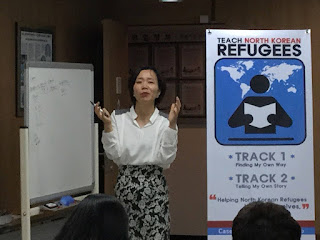As of 2015-09-15, (TNKR) Teach North Korean Refugees has held 36 sessions matching about 195 North Korean refugees with about 300 volunteer tutors.
We have held four or five sessions teaming up with other NGOs or non-profits. Tonight we teamed up with the Korea Hana Foundation to hold a very nice Language Matching session. It was our second Language Matching session since Saturday.
On Saturday (2015-09-12), we hosted a session with 16 tutors, 10 North Korean refugees, and 12 volunteers. Tonight (2015-09-15) we had a session with 10 volunteer tutors, 6 North Korean refugees and 4 South Korean counselors. as study partners.
The North Korean refugees will study with their counselors as part of a team along with a tutor. Each team got at least two tutors each.
Thanks to Raisook Kim, Amanda Radalinsky, Cat Righton, Jared Hatcher, Martha Wilson, Bryan Salazar, Linda Tsai, Ingue Chun, 이지유 Ziu Yi, Dan Svoboda for joining TNKR.
* * *
2020 reflection: Newcomers, reporters, researchers and others often ask us: Have you tried working with other organizations?
Well, yeah!
Unfortunately, most of the people asking the question don't have any actual contacts, they are just curious.
They were asking us that even before we became an organization. At that point, we were probably a risk to them, being the fly-by-night organization that we were then. Back then, we were still new, but because of refugees starting to talk us up, we had more organizations reaching out to us.
* * *
2021 reflection: It was truly a heart-warming session. Looking back, the education results were probably a failure. As I had predicted at the time, it was doomed to fail.
* The South Korean counselors had much higher English levels. It was a nice thought to have them in study pairs with the refugees they were counseling, but the reality didn't produce as good of an outcome as the dream. When we worked with NGOs, they wanted to be in study pairs with North Korean refugees (and that was also something that businesses wanted, they wanted their employees to have the experience, it didn't seem to matter if it was better for the refugees).
* One problem we had is that many of the refugees dropped out or got busy. So we then had the uncomfortable situation of some tutors being left with a South Korean counselor as a student when the refugee canceled for a class. That was not meant to be the purpose of the session. We tried such small study groups a couple of times, then I think after this Matching session, I banned study groups in the future.
* A good thing about it is that we partnered with the huge Hana Foundation. At that time, TNKR (now FSI) was not even a real organization! The Hana Foundation did get to learn a bit more about us because of that session. FSI co-founder Eunkoo Lee has written a couple of successful grant proposals to them. We were already on a path to getting to know them, a Hana Foundation staffer had contacted me earlier in the asking to learn about what we were doing. That happened because we had some North Korean refugees telling the Hana Foundation about us. I was wondering if having such a session would be good or bad, because it might not yield good education results, but then they could learn about us then instead of waiting for the day that we became an official organization (whenever that would happen, in late 2015 we weren't sure what was going to happen).
* A bad thing is that I recall that we had some refugees criticize us for working with the Hana Foundation. They have some critics who watch every single thing they do. On the other hand, we had some refugees who were criticizing the Hana Foundation for not supporting us financially (they didn't give us any financial support for that session).
* Knowing that we could eventually apply for grants from the Hana Foundation, I warned the volunteers (as I warned them at every session) that we had to be on our best behavior, to be as professional as possible, that their actions could help or hurt the organization's reputation in the long-run.
* We didn't have an office at that time, we were operating out of
A) my desk at Freedom Factory
B) The Bitcoin Center where we had just opened a study center
C) for this session, we used the much more spacious Hana Foundation Center office.
Things have changed very much since that night 6 years ago. At that time, we were all volunteers. In 2016, we became an official organization, then sometime in 2017, we had the first paid staffer in our history.
* Support TNKR: www.lovetnkr.org/donate
* Campaign to resume tutoring: https://give.lovetnkr.com/Tutor-NK-refugees





























